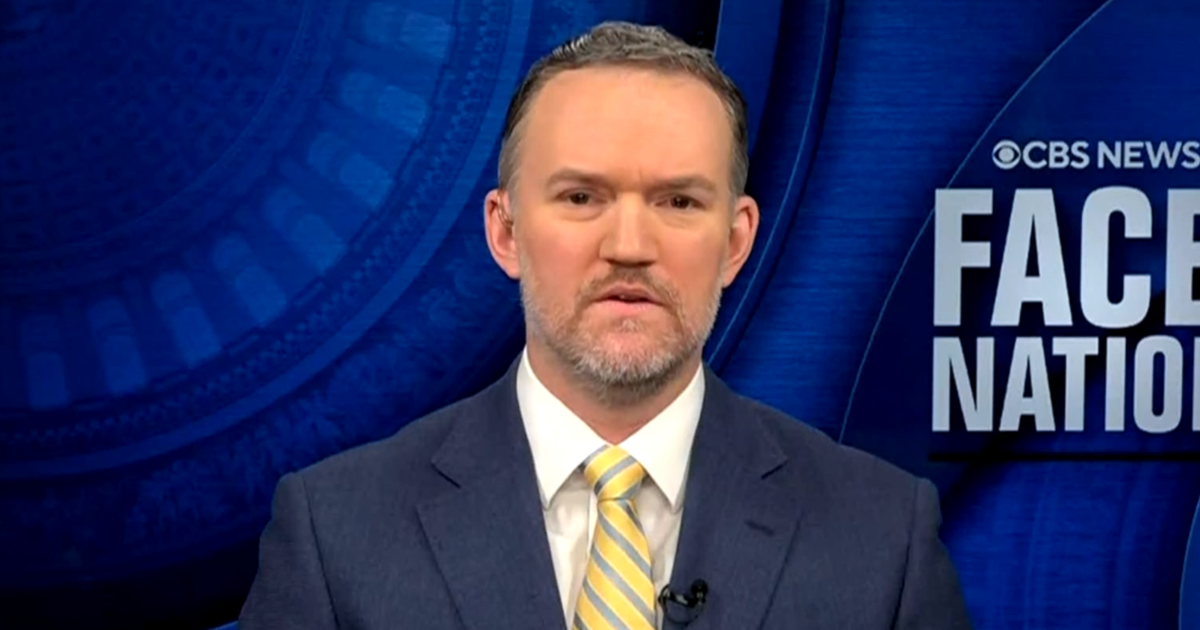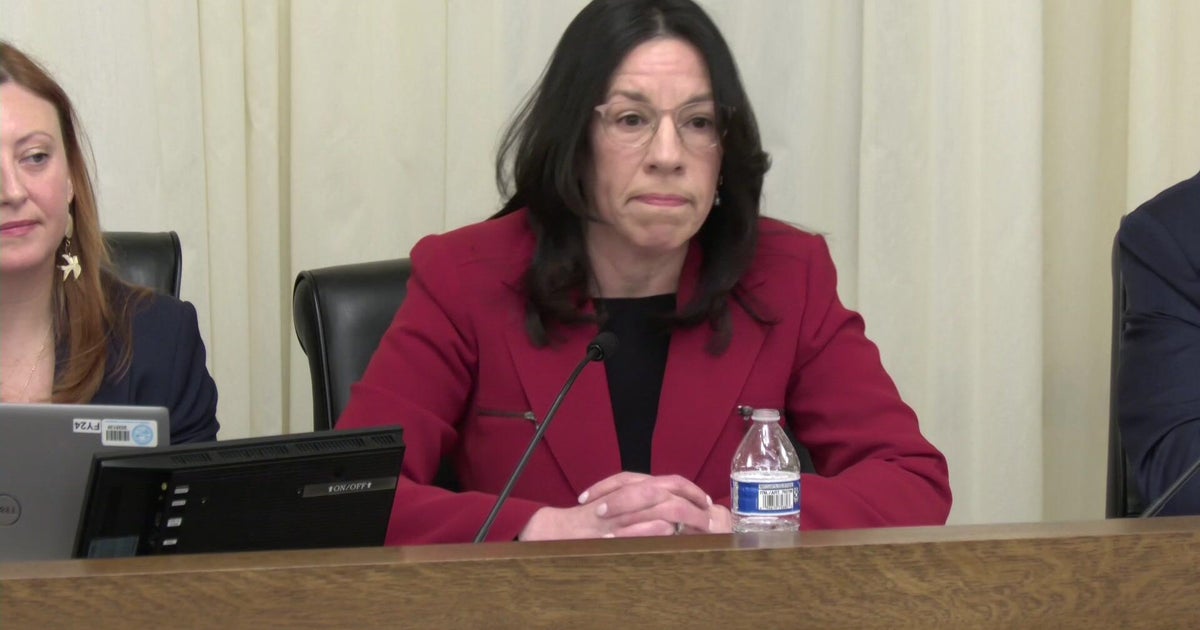Transcript: Scott Gottlieb discusses coronavirus on "Face the Nation," April 26, 2020
The following is a transcript of an interview with former FDA Commissioner Scott Gottlieb by CBS News' Margaret Brennan that aired Sunday, April 26, 2020, on "Face the Nation."
MARGARET BRENNAN: Joining us now from Westport, Connecticut is former FDA commissioner Dr. Scott Gottlieb. Good morning to you.
DR. SCOTT GOTTLIEB: Good morning.
MARGARET BRENNAN: What do you make of what the mayor described with this very early case of COVID-19, February the 6th? What does that shift of the timeline indicate to you?
DR. GOTTLIEB: Not much that we don't already know. We know there were imported cases on the West Coast early in- in sort of mid-January to late January. We know that from the work that's been done at The Hutch in Seattle from Trevor Bedford. So it's not surprising that there also were imported cases into parts of California. There was a lot of travel from China into that region. And the cases that got into the West Coast were probably cases from China that got in before the travel restrictions were put into place. And so it shows that they had earlier clusters, but it- it's not inconsistent with what we already assume. The seeding on the East Coast seems to have been from Europe, mostly from Italy. The seeding on the West Coast seems to have been from China.
MARGARET BRENNAN: Are those different strains of the same virus?
DR. GOTTLIEB: They're due- there are different strains and there appear to be two predominant strains here in the U.S. They're both on both the East Coast and the West Coast. Now, one strain predominates on the West Coast, one strain predominates on the East Coast. There's no reason at this time to believe that the different strains have different infectivity, different virulence, that one is more dangerous than the other. But that's something that's being looked at right now by people who are sequencing these strains and trying to correlate these sequences of the strains, the genetic profile of these strains with outcomes to see if people that have one kind of strain are having worse outcomes or getting infected at higher rates.
MARGARET BRENNAN: Parts of the country are opening up. Georgia, you know, getting a lot of attention for how much they've opened up and so quickly. What does that do to the rest of the country? Does it up the risk of infection?
DR. GOTTLIEB: It does up the risk of infection. Georgia's certainly not out of the woods. They're only testing about 1 percent of the total population. They have 23,000 cases. They may have plateaued in their epidemic maybe, but they're still accruing a lot of new cases and they certainly aren't coming down in terms of the number of new cases each day. The slope up in terms of cases that got us to the point of this epidemic was a rapid slope. It was a rapid progression up that- up that epidemic curve. The slope down is going to be far more gradual. Now, in China, the slope down was symmetric with the slope up. It was a much more symmetrical epidemic curve. But in Italy, what you've seen is a gradual- they rapidly grew the number of cases and they're very slowly coming down. We're likely to look a lot more like Italy. So it's going to take some time until we see sustained declines in new cases and get to the point where there's a low enough- low enough level of spread in the country that we could feel comfortable about opening up parts of the country. It's going to be probably mid-May, maybe late May in parts of- parts of this nation. Georgia's certainly jumping the gun I think here getting- getting started too early, relative to where they are in their epidemic.
MARGARET BRENNAN: I want to ask you about Rick Bright. He ran an agency BARDA. People don't know that agency. But it was working on a vaccine and he was pushed out of the job. He says he's going to file a whistleblower complaint and that this all stems back to some public or- or some concerns he had raised about the president's public touting of hydroxychloroquine. Do you think this personnel change-up has an impact on America's ability to quickly develop a vaccine?
DR. GOTTLIEB: It's hard to say it doesn't. I know Rick Bright well. I worked closely with him. I testified alongside him before Congress. He was very effective in that role. We worked together on an Ebola vaccine and a treatment for smallpox. People knew him. I think it was important to have continuity in that job. And he was effective. He was a vaccine expert, so I was sorry to see him go. I think changing leadership in that position right now certainly is going to set us back. It's hard to argue that that's not going to have some impact on the continuity and also make businesses, companies that need to collaborate with BARDA, a little bit more reluctant now to embrace BARDA now that there's a cloud hanging over it and some uncertainty about the leadership. So I was really sorry to see that happen.
MARGARET BRENNAN: Well, what about the concerns regarding hydroxychloroquine? I mean the FDA put out a warning this week that it could have a negative impact for your heart if you take it as a treatment. Should doctors continue to try it?
DR. GOTTLIEB: I don't think doctors should be using it outside of protocols at this point, given the fact that we've had now accruing evidence demonstrating really no benefit and some indication that it could be causing harm. It- I think it's still reasonable to conduct clinical studies with it to see if it could be effective as a treatment. But we've done a lot of clinical studies to date and nothing really- we haven't turned over a card that's really shown that the drug's effective. This was being used very widely in New York City and other cities as well. It was being used very widely in It- Italy also, off label as a treatment initially in the setting of this outbreak here in the United States. I think a lot of doctors that I talked to in New York City is starting to pull back from using it right now, given the fact that they really haven't seen an indication that's having a robust treatment effect.
MARGARET BRENNAN: You're a doctor. You're a scientist. What was your reaction when you heard the president say he wants to explore using disinfectant on the lungs, quote, almost a cleaning of them. What did you think?
DR. GOTTLIEB: Well, look, this is a- this is a constant concern that people do try disinfectants as agents. There is a perception out there sometimes among some people that they could be effective. There's no effective use of a disinfectant internally. And people need to be- we should be very clear about that. Nobody should be using a disinfectant as an ingested agent, injecting it, eating it, in any fashion. These are deadly agents. We see thousands of calls to poison control each year around people who consume, disinfect. And so we need to be very clear about this, that nobody should be consuming a disinfectant. And they don't work for the treatment of anything, let alone coronavirus.
MARGARET BRENNAN: So that's a fairly clear, do not do this. Thank you, Dr. --
DR. GOTTLIEB: That's right.
MARGARET BRENNAN: Dr. Gottlieb. We will be right back.



